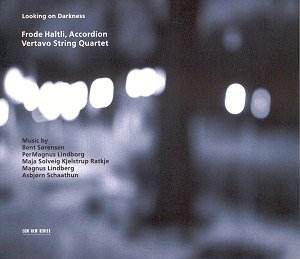The accordion has long been an instrument generally associated
with folk or popular music and has only recently been given some serious
attention by contemporary composers, often from Nordic countries. I do
not know whether this situation is due to any particular reason other
than the presence of excellent players who developed a remarkable playing
technique enticing composers to write for them. Haltli’s teacher in Copenhagen,
Magnus Ellegaard, for whom Nordheim and Nørgård composed
several pieces, was one such virtuoso. Haltli and the Finn Matti Rantanen
belong to a younger generation of brilliant players for whom many Scandinavian
composers have also consistently composed. Indeed, all pieces here, but
Lindberg’s Jeux d’Anches, were written for and/or dedicated
to Frode Haltli.
Sørensen’s Looking on Darkness
inspired, so we are told, by Shakespeare’s Sonnet XXVII is a
brilliant study in light and shade, movement and stasis, conjuring up
an often troubled, unpredictable sound world displaying a remarkable
wealth of invention. Lindborg’s Bombastic SonoSofisms,
in spite of its queer and rather enigmatic title (there is nothing bombastic
about this music), is another brilliant showpiece, albeit in a somewhat
more accessible idiom than Sørensen’s sometimes intractable piece.
Schaathun’s Lament is rather more overtly expressionistic
in mood, alternating slow sorrowful moments and angry outbursts of some
energy before ending peacefully on a long-held high note (an incredible
technical feat on the player’s part, this). Lindberg’s Jeux d’Anches
is a much more congenial piece, though still very demanding, but nevertheless
quite accessible. (Lindberg’s earlier Metal Works for
accordion and percussion is rather more difficult and taxing.) This
is the piece’s second recording (Rantanen recorded it on Finlandia FACD
404 some years ago) and this one is as fine as the earlier recording.
The most ambitious work here is Ratkje’s Gagaku
Variations for accordion and string quartet. It is a quite substantial,
if overlong piece evincing great imagination and sometimes great beauty,
alternating ruthlessly energetic variations and moments of deeply felt
tenderness. It cleverly eschews the all too evident trap of fake Orientalism
though the very end of the piece makes its origin quite clear. The accordion
does not stand out in a soloistic position but is rather a full-time
equal partner adding some further instrumental and expressive colour
to the strings’ sound. As in Hoskawa’s In der Tiefe der Zeit
for cello and accordion which I reviewed recently, the accordion suggests
the sound of the sho (i.e. the Japanese mouth-organ).
Haltli is a formidable player as well as an excellent
musician. He plays with strength, commitment and conviction and his
committed readings of these often difficult pieces cannot be bettered.
Now, this is a most unusual programme of works for a most unusual instrument;
and some may find it hard to listen to it in one take. This is obviously
the sort of thing to be sampled, piece by piece; and I would suggest
that any newcomer to this repertoire starts with Lindberg’s piece. Not
for the faint-hearted, maybe, but well worth the effort.
Hubert Culot
